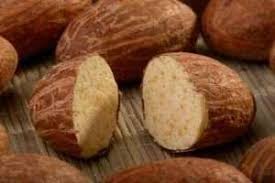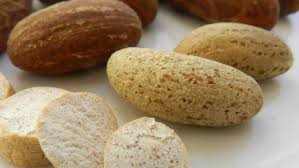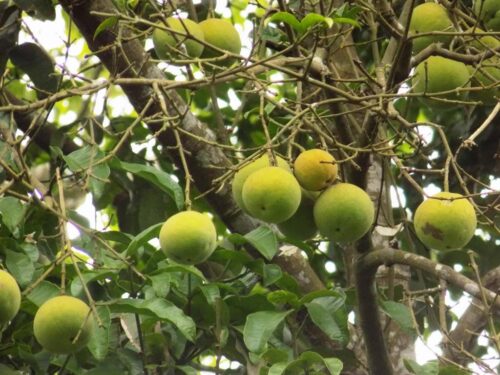Bitter kola (Garcinia kola) is an ancient tree plant that belongs to the Guttiferae family and is native to West Africa.
It is rich in phytochemicals and is often referred to as a wonder plant because almost every part of it has immense medicinal benefits.
The seeds are the most popular part of the plant. They are chewed raw and commonly called African wonder nut, male kola, false kola, Aku-ilu (Igbo), Orogbo (Yoruba), and Namigin-Gworo (Hausa).
When chewed, the bitter kola seeds have a bitter taste that gently evolves into a sweet, smooth taste.
The bitter kola seeds possess anti-inflammatory, antimicrobial, and antiviral properties. And have been in use in traditional medicine to treat HIV/AIDS, Ebola virus, and diabetes.
This article outlines the nutrition facts, health benefits, uses, and side effects of bitter kola seeds.
Nutrition facts
Bitter kola is rich in nutrients, alkaloids, flavonoids, saponins, and other phytochemicals.
The seeds particularly contain “kolaviron”, a bioflavonoid that is responsible for its many health benefits.
The seeds are safe to eat and contains the following nutrients [1]:
- Carbohydrates
- Protein
- Fats
- Fiber
- Moisture content
- Potassium
- Calcium
- Magnesium
- Vitamin C
- Caffeine (trace amounts)
Although preliminary studies say it contains these nutrients, more research is required to determine the exact quantities of each nutrient.
Possible health benefits of Bitter Kola
The possible health benefits of bitter kola include:
Diabetes

A high blood sugar level is a common symptom of diabetes.
Recent studies suggest that “kolaviron”, a flavonoid extracted from bitter kola may help to reduce blood sugar levels and hyperglycemia in animal models. However, more human studies are needed. [2]
Common cold
Bitter kola has long been in use in ancient African medicine, to treat symptoms of the common cold. It soothes the throat and relieves congestion.
It also helps to expel thick mucus from the lungs and reduces excessive coughing.
To prepare bitter kola for cough simply mix one part of ground kola seeds with five parts of honey in a 1:5 ratio. Take a spoonful three times daily until symptoms disappear.
Related: 20 best natural remedies for cold and cough in adults
Infections
Bitter kola seeds have been in use in African traditional medicine to treat microbial infections, dental caries, and malaria.
Studies have shown that the seeds contain compounds that elicit activity against bacteria that cause dental caries in humans. [3]
Several other studies have reported that Garcinia kola is effective against a wide variety of microorganisms including HIV and the Ebola virus. [4] [5] [6]
Osteoarthritis
Osteoarthritis is the most common type of joint pain affecting the knees. It is commonly found in the elderly or athletes.
One study showed that Garcinia kola significantly reduced inflammation, pain, and improved movement in patients with knee osteoarthritis. [7]
Eye health
Glaucoma is the leading cause of irreversible blindness.
One 2010 study found that topical application of 0.5% aqueous eye drops of bitter kola was as effective as timolol maleate 0.5% eye drops in lowering intraocular eye pressure (IOP) and ocular hypertension in patients. [8]
Note: Timolol is a beta-blocker and the drug of choice for reducing intraocular pressure.
Anti-poison
In African traditional medicine, bitter kola is used as an anti-poison to treat toxin ingestion.
Earlier animal studies showed that Kolaviron significantly antagonized the lethal poisoning of mice with phalloidin (experimental toxin) supporting its use in African medicine. [9]
Antioxidant
Bitter kola is rich in antioxidants that protect human cells against oxidative damage and reduces the risk of metabolic disorders like cancer, diabetes, and hypertension.
Studies showed that kolaviron, an extract of kola, showed strong antioxidant and scavenging activity by inhibiting oxidative damage. [10]
High cholesterol
High cholesterol or hypercholesterolemia is a condition of excess cholesterol in the blood. It can limit blood flow and increase the risk of a heart attack or stroke.
One study found that kolaviron, an extract of bitter kola, exerts a cholesterol-lowering effect and reduces the relative weight of the heart in cholesterol‐fed animals. [11]
However, more human studies are required to determine the exact mechanism of action.
Sexual health
Bitter kola is popular as an aphrodisiac for both men and women in Africa. The fresh seeds are usually chewed raw or ground with other herbs to boost sexual activity.
One South African study found that Garcinia kola increased testosterone secretion and testicular weight in animal models.
And also enhanced male libido and potency after treatment for 28 days. [12]
Related: 20 best Fertility Foods for men and women
Other uses of Bitter Kola
Other traditional uses of Garcinia kola include [13]:
- Beer: Garcinia Kola is being investigated as a possible alternative for hop in beer production.
- Welcome gift: Among the Igbos of Nigeria, kola seeds are presented to visitors as a sign of peace and welcome.
- Stimulant: In some parts of Africa, the seeds are chewed in the morning to enhance mental alertness.
- Snake repellant: Due to its bitter taste, some cultures use the seeds to repel snakes and other reptiles.
Does bitter kola have any side effects?

Bitter kola has no known interaction with orthodox medications. The active ingredient, kolaviron does not appear to have a pronounced effect on drug-metabolizing enzymes. [14]
You can eat it with or without other foods.
However, it is best to eat it an hour before or after meals to increase the key ingredients’ absorption.
Also, food does not affect the metabolism of bitter kola, and it may ease the effects of mild indigestion.
The bottom line
Bitter kola is incredibly nutritious, healthy, and full of medicinal benefits.
It can be eaten on its own, uncooked, like many other nuts but keep in mind that it’s called “bitter” for a reason.
- Mazi E. 2013. Physico-Chemical and Nutritive Properties of Bitter Kola (Garcinia Kola) DOI: 10.4172/2155-9600.1000218
- Tchimene M. et al 2016 Anti-diabetic Profile of Extract, Kolaviron, Bioflavonoids and Garcinoic acid from Garcinia kola seeds. International Journal of Current Microbiology and Applied Sciences 5(2):317-322 DOI: 10.20546/ijcmas.2016.502.036
- Ajayi T. et al 2014. Antimicrobial Activity of Garcinia kola (Heckel) Seed Extracts and Isolated Constituents Against Caries-causing Microorganisms. African Journal of biomedical research.
- Omonigho, Daniel & Ezeanya, Chinyere. (2013). Antibacterial activity of Garcinia kola seed and leaf extracts on some selected clinical isolates. Science Journal of Microbiology. 1-9. 10.7237/some/298.
- I. I. Madubunyi (1995) Antimicrobial Activities of the Constituents of Garcinia Kola Seeds, International Journal of Pharmacognosy, 33:3, 232-237, DOI: 10.3109/13880209509065369
- BBC, Health: Ebola Cure Hope, Thursday, August 5, 1999, UK. 1999. Available from:http://www.news.bbc.co.uk/1/hi/health/411030
- Olayinka O. et al. 2008 Clinical effects of Garcinia kola in knee osteoarthritis. Journal of Orthopaedic Surgery and Research
- Adebukunola A. et al. (2010). Efficacy of Garcinia kola 0.5% Aqueous Eye Drops in Patients with Primary Open-Angle Glaucoma or Ocular Hypertension. Middle East African journal of ophthalmology. 17. 88-93. 10.4103/0974-9233.61224.
- Iwu, M.M. Antihepatoxic constituents of garcinia kola seeds. Experientia 41, 699–700 (1985). https://doi.org/10.1007/BF02007729
- From E. et al. 2002. Antioxidant and scavenging activities of flavonoid extract (kolaviron) of Garcinia kola seeds- Journal of Pharmaceutical Biology
- Adaramoye, O. et al. (2005), Possible anti‐atherogenic effect of kolaviron (a Garcinia kola seed extract) in hypercholesterolaemic rats. Clinical and Experimental Pharmacology and Physiology, 32: 40-46. https://doi.org/10.1111/j.1440-1681.2005.04146.x
- Ralebona N. et al. (2012) Effects of ethanolic extract of Garcinia kola on sexual behavior and sperm parameters in male Wistar rats. African Journal of Pharmacy and Pharmacology DOI: 10.5897/AJPP11.652
- Esiegwu A. et al. (2014) The Emerging Nutricitical Benefits of the African Wonder Nut (Garcinia Kola Heckel): A Review. Global journal of animal scientific research
- EO. et al (2000) Chemoprevention of 2-acetylaminofluorene induced hepatotoxicity and lipid peroxidation in rats by Kolaviron- a Garcinia kola seed extract. Food Chem Toxicol.
- Cheku, V.(2018). A descriptive cross-sectional study on various uses and outcomes of Garcinia kola among people of Oshimili North in the Delta State of Nigeria. https://doi.org/10.4103/ayu.AYU_195_16
Get new free and exclusive health tips delivered straight to your inbox!



